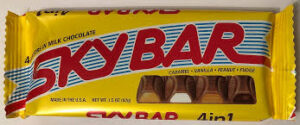Sky Bar
Sky Bar
by Paul Marion
The barbershop on upper Merrimack Street had a candy vending machine against the long side wall where customers waited in padded steel chairs. When I had a dime, I’d slot the coin and pull the handle for a Sky Bar in a yellow wrapper with its four squares of flavor. I always felt I was getting a lot for my money with its variety: caramel, vanilla, peanut butter, and fudge encased in milk chocolate. You could break off one or two sections and save the untouched others in the wrapper for later. Yes, you could, technically, but I always ate the whole thing. The candy bar had premiered in 1938 with ads in skywriting. There’s the name.
My father would drive my brother David, five years older, and me to the Majestic Barbershop near the public library in Lowell, Mass. I don’t know why my father chose that shop from among twenty others around the city. Maybe because it was on the edge of the historic French neighborhood, Little Canada. A gray-haired man and his son owned the business. My impression is that the father was from Greece or Syria. On Saturday mornings, which was our time for haircuts, sometimes there were three barbers working the swivel chairs facing a wall of mirrors. Wide dark leather strops hung from the chair-backs like something out of a Wild West frontier town shop. On these strops, barbers sharpened straight razors used for shaving faces or cleaning the backs of necks as the finishing touch of a haircut. Colorful bottles of hair lotion and after-shave arranged on the counter under the mirror wall resembled a line-up of liquor bottles at a bar, yellow-green, amber, light blue, rose.
It was the era of Brylcreem slickness, whiffles, and the regular boy’s haircut with a little turned-up wave in front—no hair touching the ears and no curls falling over shirt collars. This was pre-Beatles America with military neatness as the norm. (Exhibit A was Elvis getting clipped in the U.S. Army.) And in our mostly Catholic network that neatness was reinforced by the cleanliness-is-next-to-Godliness doctrine, all intensified by the French-Canadian social chromosome that drove mothers and grandmothers into battle against dust, germs, and grime, determined to keep homes, clothes, and children safe from the dirty devil from hell-ville below.
Those were the days of teen fashion shaped by Dick Clark’s American Bandstand on TV, the at-first clean-cut Philadelphia region kids who wore sports coats and dresses when they gyrated to songs. The Bandstand shorthand (two sentences) on the regular Rate-a-Record segment was “It’s got a good beat. You can dance to it.”
Graduating from a whiffle (crew cut, flat top, buzz) after the first grade, meant biweekly trips to the barber for me. Before the Majestic Barbershop routine, my father took my brothers and me to the cellar of a house on Martin Street in the Rosemont section of Lowell, a sub-neighborhood between the Centralville and Pawtucketville neighborhoods, along the meandering Beaver Brook that flows south from the New Hampshire state line and through Dracut on its last leg before washing into the Merrimack River. The area had a mix of single-family homes and tenements with a few small businesses tucked in.
For a time in his youth, my father lived in the Rosemont, sometimes called Rosemont Terrace, a heavy-duty French-Canadian American breeding ground. Almost every family had a yard full of kids, five or seven being common. The Marions, one of the Rosemont clans, at times occupied two- and three-deckers on Martin Street. Mr. Lachapelle cut hair on the side to make a few extra dollars. Pretty soon he was taking customers from the parish and extended family. A dad could get his kid a whiffle for a dollar, no complaints allowed. We were related to the Lachapelles somewhere down the family line.
I asked the family genealogist, Florence Y. Marion of Martin Street, about the name “Rosemont,” meaning “rose hill” or “rose mount,” but she didn’t know the origin other than to say it was perhaps the name of a farm in the area before houses were built on the property. I thought there may have been a swath of wild roses at one time or that the farmer, if there was one, had cultivated special rose bushes on his land. In a novel set in Lowell the area is called “Rosemont the Mysterious.”
For me, the Rosemont is a place of origins and psychic power. It’s a place of beginnings and myths even, from the riverside natives and colonists to immigrants turned rooted occupants, citizens, and storytellers, the people who achieved a stable enough life to have time to cut each other’s hair and buy candy bars for their kids. For one hundred years, people attached by thick and thin strands to French Canada had a saturated presence in the area. I can unwind from that cultural spool, but the thread will never give out completely.
(c) 2025 by Paul Marion

The Sky Bar is a wonderful appetizer to a delicious essay.
American Bandstand played a major role as I was growing up in North Jersey. I even got to dance on it a couple of times! Oh, the memories!